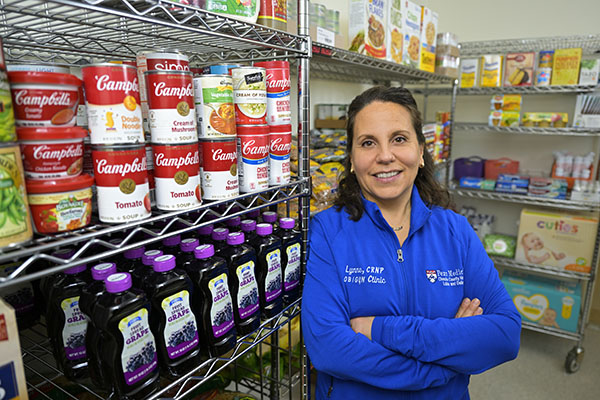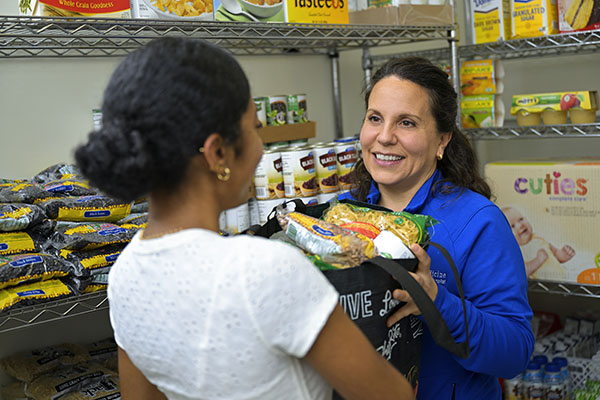
Early in the pandemic, a nurse at the Chester County Hospital Ob/Gyn Clinic noticed that many patients were struggling to feed themselves and their families.
The clinic offers reduced-rate gynecology care, affordable prenatal care, and for qualifying patients, free childbirth deliveries. Many patients are Spanish-speaking and under- or uninsured.
Lynne Rudderow, MSN, CRNP, WHNP-BC, the nurse practitioner who made the observation, began asking for food donations from several departments around the hospital. All the while, she had an idea for a permanent remedy: a food pantry housed at the clinic. The hospital’s administration endorsed the idea. Next, Rudderow approached the Chester County Food Bank.
The Ob/Gyn Clinic has collaborated with the food bank at different times since the food bank's inception in 2009. Most recently, in 2017, the food bank provided the clinic with "prenatal grocery boxes" filled with nonperishable food intended for expecting and new moms.
"The prenatal grocery boxes were an initial step to serve our patients and their families better," Rudderow says. "As we increasingly screened patients for food insecurity, it became clear that we needed to do more to provide direct service and food offerings to food-insecure individuals."
Last October, the food pantry at the Ob/Gyn Clinic became a reality. The Chester County Food Bank, which stocks the pantry with various nonperishable foods, made its first delivery on October 7.
In its first month of operation, the pantry served 47 households, more than 50 percent of which included children, according to Rudderow. (For each individual who receives a donation from the food pantry, Rudderow asks how many people are in their household and how many are children.) As of February, the food pantry had distributed donations to a total of 238 households.
Rudderow says it's been a mix of new and familiar faces.
"Because we're an Ob/Gyn practice, the patients come back according to their pregnancy age,” she says. "An early-pregnancy mom might come once a month. A late-pregnancy mom might come once a week. And we get new patients all the time. So we're seeing repeats, but there are also lots of first-time visitors to the pantry, too."
In both cases, the reaction, she says, is the same.
"When I hand them a bag of food, it's like I’ve handed them a million dollars,” Rudderow says. "They’re just overwhelmed with emotion and, of course, that makes me emotional, too."
She continues: "Here I am supplying them with food, a basic need – this is not an above-and-beyond thing. It’s just a basic need – and they’re overwhelmed by it. Their gratitude makes all the effort that goes into having the food pantry worth it."
Rudderow admits it's "challenging" balancing the supervision of the food pantry with her everyday responsibilities as a nurse practitioner and the manager of the Ob/Gyn Clinic.
"I do a lot in my spare time. I don’t know – I just get it done,” she says. "I’m a mom of six, so I'm used to juggling a lot. But I'm also buoyed by the support of the administration."

Rudderow is simply compelled to help. This winter, when she saw some of the clinic’s patients arriving for their appointments in flip-flops and t-shirts, she organized a winter coat and boot drive at the hospital. She says she received "hundreds" of coats. As that was wrapping up, she was actively seeking another way she could help improve the lives of the clinic’s patients.
While Rudderow handles much of the food pantry’s daily operations, she received help from the hospital's administration and the Community Health and Wellness Department in bringing it to fruition. And the hospital's Plant Operations staff constructed the pantry. The Ob/Gyn Clinic's staff helps Rudderow bag food. They also promote the food pantry through their personal social media accounts and collect donations.
"Some of us have even placed a bin outside our homes to collect nonperishable food donations from neighbors, which we will then deliver to the hospital," Rudderow says. "All of our staff here is super-committed to our patients."
They solicit donations from within the hospital too to supplement the food pantry’s weekly delivery of nonperishable groceries.
Soon after the pantry's opening, the Chester County Food Bank donated $1,000 in ACME Markets gift cards to the pantry. The ACME Markets Foundation and its parent company"s Nourishing Neighbors program awarded the food bank $10,000 in ACME Markets gift cards for distribution throughout its partner agencies.
"We are fortunate to have Penn Medicine Chester County Hospital, a leader in healthcare, in our community," Andrea Youndt, CEO of the Chester County Food Bank, said at the time of the donation. "Having the hospital screening patients for food insecurity and being able to directly serve them with emergency food assistance with an onsite food pantry not only best serves the client but also helps to alleviate demands placed on community food cupboards. Our partnership with Chester County Hospital is vital to our ability to serve our community and ensure access to real, healthy food."
Rudderow says the food bank asked her to buy groceries for the pantry with the gift cards. In March, she had not yet used them because she wanted to make sure she uses them appropriately.
"My population is largely Hispanic, so I want to get food that I know they will eat," she says. "Right now, the food bank has been wonderful, and I'm supplying those foods, but I’m holding on to these gift cards in case we ever run short of culturally appropriate foods. If that happens, I'll use these cards to make sure we have them."
That’s just one way Rudderow has her eye on the future. Seeing how quickly many of the clinic’s patients came to depend on the food pantry, she wants to see it evolve beyond its current offerings by stocking it with fresh eggs, meat, and produce. She’s even considering starting a garden in service to the pantry. Such a shift would require the addition of a large refrigerator and a slew of logistics.
For now, she’ll remain patient – to an extent – and continue to help however she can.